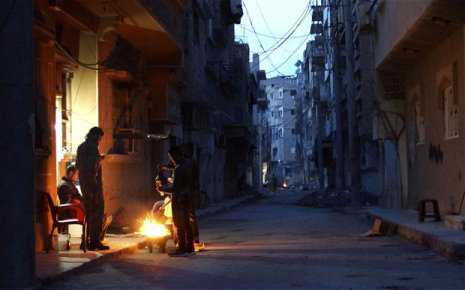Syrian rebels told by West to unify and reject extremism
Syrian rebels were told by their western backers on Saturday they had to present a united face and reject extremism in return for a major new package of non-lethal assistance.
The West has been reluctant to provide even non-lethal aid to rebel fighters Photo: Reuters
By Richard Spencer, Istanbul
4:05PM BST 20 Apr 2013
Foreign ministers of nations backing the Syrian opposition, including William Hague, the Foreign Secretary, and John Kerry, the US secretary of state, met opposition leaders in Istanbul to thrash out a major new aid package.
They continue to reject directly supplying the opposition with arms, despite fighting reaching a bloody stalemate across the country, but the US was on the verge of announcing up to $200 million in “non-lethal” military aid – equipment such as body armour and night-vision goggles.
Diplomatic sources told The Daily Telegraph that in return the allies were demanding an end to internal wrangling in the opposition Syrian National Coalition, the Western-recognised political front for the rebels.
The SNC was being asked to sign up to a three-pronged pledge. They had to reject extremism and present an inclusive face to the world that included religious minorities, secular groups and women as well as the dominant Islamist faction.
Several secular members of the coalition have walked out in the last month, following the election of Ghassan Hitto, who is seen as close to the Muslim Brotherhood, as an interim prime minister for the rebels.
Related Articles
- Israeli threat to intervene in Syria
18 Apr 2013
- Assad accuses West of ‘backing al-Qaeda’
17 Apr 2013
- West will pay for ‘supporting al-Qaeda’
17 Apr 2013
- Syria: Across the Lines
18 Apr 2013
- Syria: Bashar al-Assad cuts prison sentences
16 Apr 2013
They are also being told to commit to secure Syria’s chemical weapons, a major security concern, and to present a detailed plan for “the day after” – how basic services will be run whenever President Bashar al-Assad is forced from office, assuming he is.
Anti-Syrian regime protesters chant slogans and wave the Syrian revolutionary flag during a demonstration in Aleppo (AP)
Time is running out,” one diplomatic source said, adding that the Coalition needed to show unity to be recognised as a credible leadership by those doing the fighting inside Syria.
On Thursday, Mr Kerry told congressmen: “We want to make certain that the people we’re working with are committed to pluralism, diversity, to a democratic process. There have to be a series of guarantees.”
The West, represented in the “Friends of Syria” group, has been reluctant to provide even non-lethal aid to rebel fighters, keen not to get sucked into another Middle Eastern war and afraid of bolstering the many jihadist forces among the rebels.
But America is believed to be coordinating with Gulf allies like Saudi Arabia, which are sending weapons, and the SNC on Saturday called for more direct intervention. “While humanitarian aid is a dire necessity, the Syrian opposition is also looking for support that will enable the immediate fall of the regime and an end to the suffering of the Syrian people,” a statement said.
Underlining their demands, fierce fighting claims scores of lives on Saturday. Activists and the regime confirmed major battles in the Damascus suburbs and between Homs and the Lebanese border.
In Damascus, regime troops were attacking rebels who had seized the mixed Sunni and Christian suburbs of Jdeidat Artouz and Jdeidet al-Fadel. The activists’ Damascus media office said 69 people had been killed on the rebel side, including civilians.
Near the Lebanese border, an area divided between Sunni, Shia and Christian communities, regime forces swept into four rebel-held villages around the town of Qusayr. Earlier in the week, rebels seized part of an airbase north of Qusayr, showing the back-and-forth nature of the conflict.
